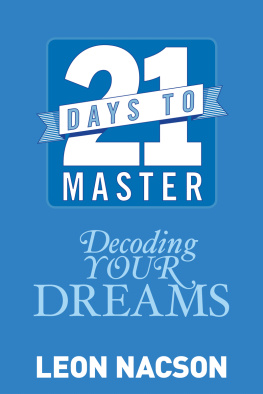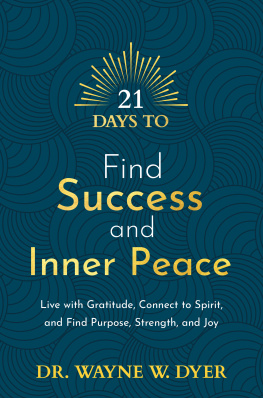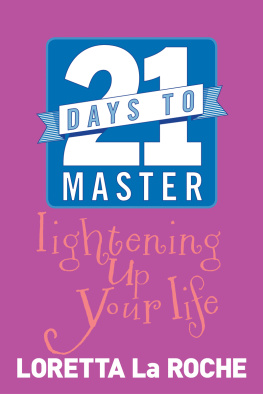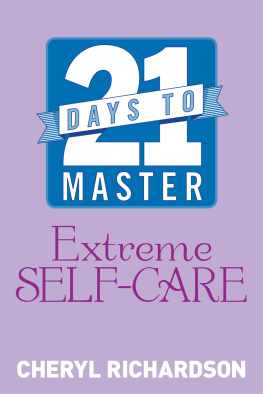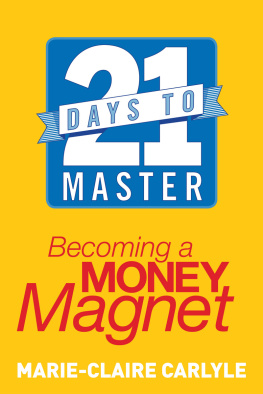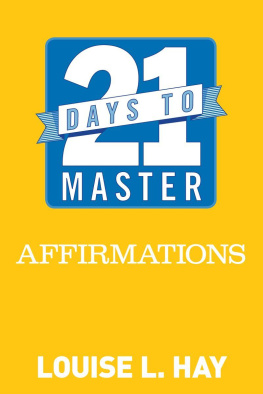Leon Nacson 2011
The moral rights of the author have been asserted.
All rights reserved. No part of this book may be reproduced by any mechanical, photographic or electronic process, or in the form of a phonographic recording; nor may it be stored in a retrieval system, transmitted or otherwise be copied for public or private use, other than for fair use as brief quotations embodied in articles and reviews, without prior written permission of the publisher.
The author of this book does not dispense medical advice or prescribe the use of any technique as a form of treatment for physical or medical problems without the advice of a physician, either directly or indirectly. The intent of the author is only to offer information of a general nature to help you in your quest for emotional and spiritual wellbeing. In the event you use any of the information in this book for yourself, which is your constitutional right, the author and the publisher assume no responsibility for your actions.
A catalogue record for this book is available from the British Library.
eBook ISBN: 978-1-84850-900-9
To Rhett and Natalia
Acknowledgements
Id like to thank Louise Munnich for her dedication to this project. She kept me on time and on the program until the book was complete. Also, Ingrid Court-Jones for her brilliant editing, Dan Benton and and Michelle Pilley for bringing all of it into reality.
Publishers note
Research has shown that establishing a habit requires 21 days practice. Thats why Hay House has decided to adapt the work of some of its most prestigious authors into these short, 21-day courses, designed specifically to develop new mastery of subjects such as decoding dreams.
21 Days to Master Decoding Your Dreams draws from Leon Nacsons bestselling A Stream of Dreams (Hay House, 2004).
Other titles that will help you to explore further the concepts featured in the 21-day program are listed in the section at the end of this ebook.
Authors note
In order to decode your dreams, you need to be able to remember them. I therefore recommend that you keep a recording device, such as your cellphone, by your bed, so that you can record your dreams by retelling them immediately after you wake up. (If your phone does not have the facility to record voices, check on the Internet to see if you can download an app that can do this.) If you do use a cellphone, ensure that its switched offnothing interrupts a wonderful nights sleep more than our smartphones. You may prefer to jot down your dreams in a notebook (your Dream Journal), or type them up on your computer. Whichever method you use, the important thing is to ensure that you record your dreams as soon as you awaken in the morning. Its important to recount the dream in the first person as accurately and in as much detail as possible, using phrases such as I am... , I feel... , I hear... , and I desire... to help you experience the dream in the moment and capture the emotions.
Introduction
Why do we dream? The truth is that all forms of research, both scientific and intuitive, are still in the process of working this out. All Im certain of is that if it wasnt a useful and vital experience, we would have stopped dreaming thousands of years ago. Once we came down from the trees, we got rid of our tails and our extra thumb. When we needed to chase food, we developed longer legs. The point Im making is that through adaptation we got rid of any organs, body parts, or bodily functions that no longer served us in everyday life. Surely we would have done the same with dreams if they didnt serve a useful purpose?
Everything that youre about to read is my personal hypothesis. These thoughts and perceptions have been critiqued by thousands of individuals who have either read my books, or seen me at live events or in the media. I have had the good fortune to work with some of the leading lights in the field of personal growth and self-empowerment. They have had an enormous influence on my work and what Im presenting here in this book. I like to call myself a dream coach because Im not interested in interpreting or analyzing peoples dreams for them. Rather, Im writing this book to ensure that within 21 days youll have all the tools you need to decode your own dreams.
Ive also deliberately left out the scientific background on sleep, how often we dream, and information about rapid-eye-movement (REM) sleep and brainwave patterns, because scientific data changes constantlyfor example, new research suggests that we do, in fact, dream continuously outside the REM sleep phase, even though it was generally accepted until recently that we only dreamed during REM. What I find particularly interesting is that one could conclude from the latest research that a lot of our dreams are there simply as entertainmentto keep us asleep while our bodies recuperate and repair themselves. After all, if you were minding children and you wanted to keep them occupied while you went about your work in the background, its likely you would either put on a DVD or turn on a television program to capture their attention. So, what if a lot of our dreams are merely distractions to keep us quiet and fast asleep while our bodies rejuvenate themselves? Its an interesting premise.
But enough of science and back to dream coaching... I am like any other coach, whether its in music, sport, or acting. We can give you the basic skills, but its up to youthe studentto play in tune, kick that goal, or recall the right lines on stage. I believe that the best dream dictionary you will ever read is the one you compile yourself, so what follows is my coaching manual for dreamers. The purpose of this information is to inspire you to interpret your dreams easily and to your own satisfaction. (However, please note that anyone who has painful recurring dreams or dreams that are medically related should not try to interpret the dreams themselves, but should instead seek professional advice.)
Dream on, my friends...
DAY 1
The Language of Dreams
Before we can start to decode the meaning of our dreams, we first need to be able to understand their language, which is our topic for today. And heres the good newsthis will be the easiest language youll ever learn because you are the creator, the editor, and the proofreader of the language of your dreams.
One of my favourite sayings is A picture paints a thousand words. If you accept this, you have accepted the reason why we dream in symbols. When were awake, symbols are universal, immediately recognizable, and easily communicated. Anyone on the planet knows that if they see a cross, or a Star of David, or a crescent moon on top of a building, the sign denotes a place of worship for Christians, Jews, and Moslems respectively. If you see a golden, archlike M on the high street, you instantly recognize the logo of a global fast-food chain and know you could get some takeaway food there. If you come across the symbol of a large tick on billboards, you immediately realize it represents a famous brand of sportswear and sneakers. We can grasp the significance of a symbol in a second, whereas it takes much longer to comprehend written words describing exactly the same thing.
When were awake, we have the facility of rational thought. While sleeping, we prefer to use a type of visual, artistic language to express ourselves because images have the unique ability to satisfy all our five senses at once. When we are in the dream state, its economical to use an image to describe a situationsimilar to opting to watch the movie rather than to read the book.

